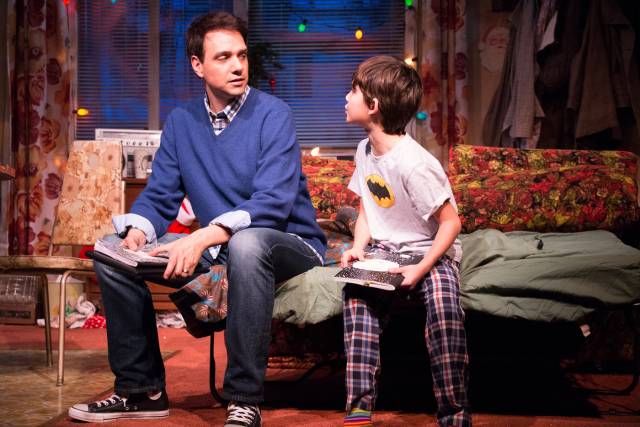

The best reason to see Abingdon Theatre Company’s production of Charles Messina’s late-1970s New York City family dramedy A Room of My Own is a character known as Uncle Jackie, portrayed by Mario Cantone. On the surface, Jackie is an overly familiar type: a lonely, angry and bitchily funny gay man. (He even has a lapdog (unseen), named Pish.) But Messina provides some twists to the character that make him not just another Boy in the Band. Jackie is visited by the ghost of his mother. He eats raw hamburger by the handful. With seemingly no realization of the irony it entails, he uses brutally homophobic language when talking about fellow LGBT people. Yet Cantone brings nuance and a strange sort of soulfulness to the character that moves him way beyond easy stereotype. It’s a topnotch performance, and it comes right on the heels of another fine turn by the actor (in The New Group’s Steve.)
Jackie lives in the memory of a 21st-century playwright named Carl Morelli (Ralph Macchio), who is writing an autobiographical dramedy about his cash-strapped family, set at Christmastime in 1979. Also in Carl’s head (and trying to leap onto his page) are his parents, Dottie and Peter (Joli Tribuzio and Johnny Tammaro), his sister Jeannie (Kendra Jain), and his younger self (Nico Bustamante). Rounding out the cast is the appealing Liza Vann as Peter’s sister, Jean. Adult Carl wanders among and interacts with the characters as he writes. Sometimes they allow him to put words in their mouths, but they clearly have wills of their own. Adult Carl has a particularly contentious relationship with Little Carl, who implores him to refrain from using artistic license to sentimentalize or otherwise whitewash the family history.

A Room of My Own fiddles with the “memory play” tradition of Tennessee Williams’s The Glass Menagerie. The idea of being able to travel back to relive one’s earlier days (something also explored by Thornton Wilder in Our Town) is naturally a very appealing one for audiences. Unfortunately the fantastical device comes off as a bit stilted here. Messina (who also directs) sometimes has the actors in the 1979 story create a freeze frame, so that Adult Carl can stop and address the audience. Adult Carl’s partial detachment from the action results in Macchio having the least interesting role in the play. Sometimes I found myself wishing he would quit interrupting so that I could watch the 1979 story unfold uninterrupted.
Dottie is clearly the driving force in the Morelli household, with Peter the subordinate go-along-er. Tribuzio and Tammaro do a fine job of showing a marriage that is highly combustible on the surface, but surprisingly stable and even oddly affectionate at base. The Morellis—including the kids—perpetually holler and curse at one another. F-bombs are volleyed like countless spitballs throughout the 90-minute show. Some of the bickering helps explicate character and some of it is comical. But at points it grows tiresome.
Among the show’s pluses is Brian Dudkiewicz scenic design. His detailed depiction of the Morellis’ cramped apartment (or, to get technical, Adult Carl’s memory of it) is first-rate.